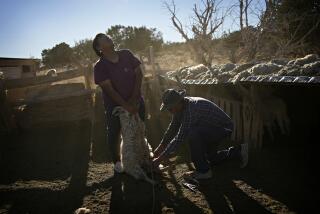<i> Thief </i> or <i> Fields,</i> It Still Offends
- Share via
There is no firm agreement on the origin and meaning of the word Navajo, which has gone through a number of spellings and pronunciations over the years.
The earliest known mention of the word is in a Spanish document dating to 1629, says David Brugge, a retired National Park Service archeologist and anthropologist who has excavated many early Navajo habitations.
Five years later, the Spanish Friar Alonso de Benavides, head of the missions and Inquisition in New Mexico, wrote that the Navajos were great farmers and said the name signified great planted fields.
Linguists think the word probably comes from Tewa, a language spoken in the Indian pueblos north of Santa Fe, Brugge says. The Tewa word na-ba-hu-u means arroyo of cultivated fields.
Another suggested etymology is the Spanish word navaja, meaning clasped knife, taken as a reference to the fact that Navajo men carried large stone knives. Brugge prefers the Tewa theory, however, because Navajos had adopted agriculture from the Pueblos by the time the Spanish arrived.
“I think that’s the most likely source,” Brugge says. “It makes sense in terms of time and place.”
He says thief or stealer-- which Navajo President Peterson Zah says came from early Spaniards--is an unlikely meaning.
For opponents of the word Navajo, however, the meaning may be less important than the undisputed fact that the name was imposed by invaders and conquerors.
“If somebody gives you a name, that name does not have a permanency,” Zah says. “Someone years ago put that name tag on us, and we’re still wearing it.”
More to Read
Sign up for Essential California
The most important California stories and recommendations in your inbox every morning.
You may occasionally receive promotional content from the Los Angeles Times.













